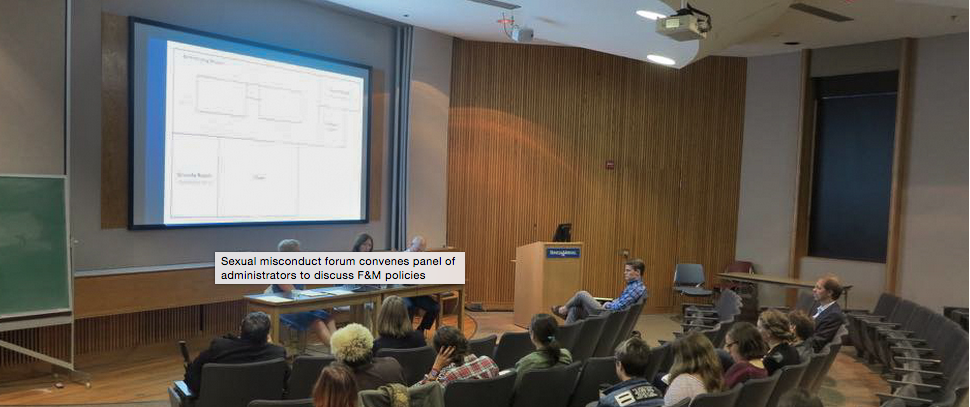By Erin Moyer || Senior Editor
Last Tuesday, Sep. 21st, the College hosted a Student Sexual Misconduct Forum in Stager Hall’s Stahr Auditorium to discuss changes in F&M’s sexual misconduct reporting and hearing process. Dan Porterfield, president of the College, convened the forum with opening remarks before giving the floor to a panel composed of Margaret Hazlett, dean of the College; Jan Masland, Title IX coordinator for the College; and Pierce Buller, general counsel for the College.

In his beginning statement, Porterfield stressed the work F&M needs to do as a community in addressing sexual misconduct on campus. Porterfield noted that, among the relatively small crowd in attendance, there were no first-years. He emphasized the need to broaden the discussion among different groups of
students.
The forum then turned to the panelists. Masland then began her portion of the panel by discussing the definition of sexual misconduct. She explained that F&M has opted to employ “sexual misconduct,” as opposed to “sexual assault,” because the term “sexual misconduct” can encompass a broader range of behavior.
Masland then outlined the sexual misconduct reporting process. If a student comes to Masland wishing to file a complaint of sexual misconduct, that student has four options. The student may choose an advisor from a trained panel of administrators, who will help them write their complaint. Masland will meet with the respondent, and explain that they are being charged. Both the complainant and the respondent will identify witnesses as part of an investigative process, and then the information will go to a hearing. The three-person hearing panel is composed of two trained administrators and, as part of a change in federal policy, an attorney. The respondent and the complainant then attend a hearing, and the three-person panel hears the evidence and recommends a sanction.
The second option available to complainants is the choice to file a complaint with the police. Masland explained that the Department of Public Safety works as go-between and support for those who prefer to work with the police. A student may also, if they do not wish to report an incident of sexual misconduct, speak with Masland, who will call the respondent into her office and issue an unofficial warning. The final option available to a complainant is to do nothing; as Masland explained, there is a two-year window for students to report cases of sexual misconduct before a statute of limitations takes effect.
Hazlett spoke next, and outlined the changes in sexual misconduct policy that have been implemented this year. One change, which Hazlett noted was brought on by a federal government mandate, allows attorneys to be present as a student’s advisor in the hearing room. Another change to the hearing process of reported sexual misconduct, Hazlett said, adds a college-selected legal expert to the team investigating a reported sexual assault. Furthermore, the three-person panel weighing in on sexual misconduct hearings will now include one college-selected legal expert, in addition to the two administrators who sit on the panel.
Buller followed up Hazlett’s remarks by placing Title IX laws within a historical context. Though the 1972 law was previously thought of to provide for equally gendered athletic teams, Buller said, it has recently been cited to apply to cases of sexual misconduct.
There were roughly 20 students in attendance at the forum. After the three speakers opened the forum up for a question and answer portion, the sparse number of students in attendance asked fairly difficult questions of the three panelists.
One student asked the panel about the change that allows respondents and complainants to bring lawyers into the hearing room as their advisors. She asked if the college has done anything to provide legal counsel to those students who can’t afford to hire it. The panel explained that complainants who choose to move forward with the hearing process are presented with a list of legal resources, some of which may do the work pro-bono. Masland also pointed out that, though now students may bring legal counsel into the room with them, complainants and respondents have always been able to hire attorneys for themselves.
Senior Erin Moyer is a Senior Editor. Her email is emoyer1@fandm.edu.